JP Morgan admits London Whale blunder cost $5.8 billion - TRIPLE the original estimate - as fired executives are forced to give BACK pay for past two years
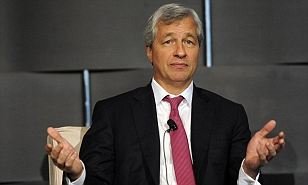
Company initially said risky trade would lose $2billion but announced Friday the total is now $5.8billion
The trader responsible, called the 'London whale', no longer works at bank
Internal investigation reports employees likely lied to about trade values in effort to cover up losses
Share price rises to $36 just before noon on Friday
|
JPMorgan Chase said Friday that a bad trade cost the bank $5.8billion this year, almost triple its original estimate, and raised the prospect that traders lied to cover up the multi-billion blunder.
The bank said managers tied to the bad trade had been fired without severance and that it planned to revoke two years' worth of pay from each of those executives.
The infamous so-called ‘London whale’ trader Bruno Iksil, who placed the extremely risky bets on the credit market prompting the massive loss, has also left the bank.
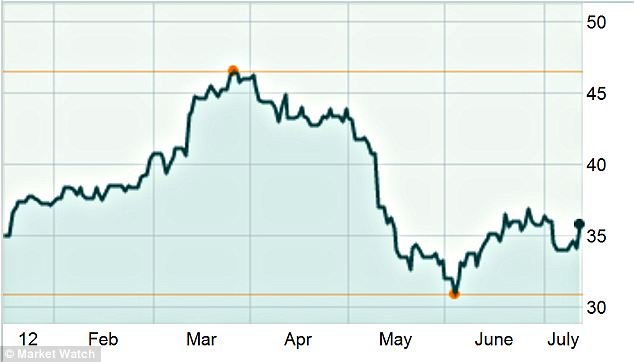
A whale of a drop: JPMorgan Chase's share price dropped dramatically after the news of the multi-billion-dollar blunder surfaced in mid April but is now on the rise, coming in at $36 just before noon on Friday
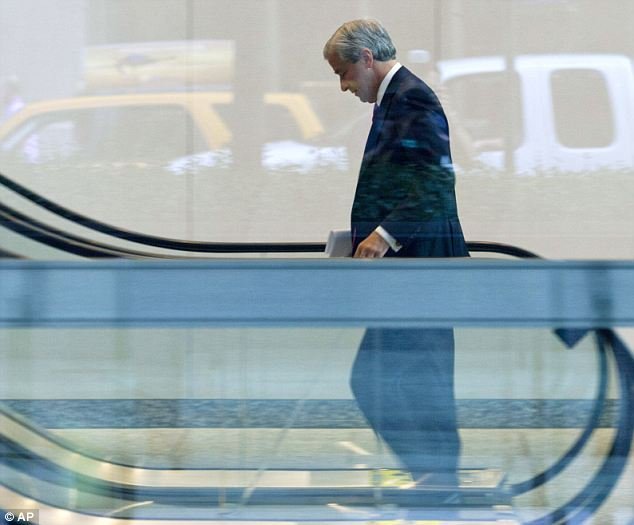
Trouble: JPMorgan Chase CEO Jamie Dimon is seen entering the bank Friday before announcing that a bad trade lead to $5.8billion in losses in the past quarter, nearly three times the amount it was expected to lose
Achilles Macris, who headed the Chief Investment Office in Europe, and a third colleague, Martin Javier-Artajo, were also no longer listed in the company's internal employment database as of Thursday, the Wall Street Journal reported earlier on Friday.
The company in May accepted the early retirement of Ina Drew, who headed the overall Chief Investment Office and worked for the bank for more than 20 years. She was the one to report that the bank lost an additional $1.4billion in the first three months of the year.
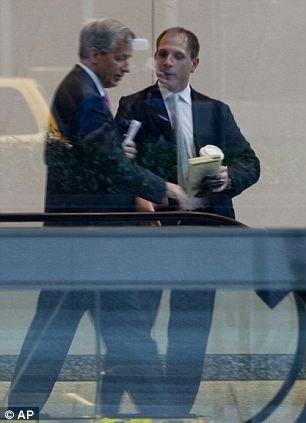
Preparing: Jamie Dimon, seen inside the New York headquarters, has close ties to President Obama but that didn't stop him from appearing before two House investigation committees
CEO Jamie Dimon spoke highly of Drew’s talents and integrity, saying she volunteered to leave and to repay the maximum 'clawback' amount of the $31.5million she was awarded in 2010 and 2011.
'I got several letters from former chairmen who talked about her contribution,' Dimon said.
'One even said she saved the company. She has acted with integrity and tried to do what was right for the company at all times, even though she was part of this mistake.'
The $5.8billion loss total is up from their earlier report that a trade lost $4.4billion from April through June, which was double the initial May 10 estimate by Dimon that the bank only lost $2billion.
Speaking broadly about the trading loss on Friday, Dimon told analysts: 'We don't take it lightly.' He added: 'We're not making light of this error, but we do think it's an isolated event.'
Dimon said the bank had closed the division of the bank responsible for the bad trade and moved the remainder of the trading position under its investment banking division.
Dimon told Congress last month that the trade was meant to hedge risk to the company and protect it in case 'things got really bad' in the global economy.
Instead, the trade has backfired and damaged the bank's reputation.
'This has shaken our company to the core,' CEO Jamie Dimon said.
As part of the long scandal, the bank organized an internal investigation. Since looking over employees’ emails and voice messages, they announced Friday that they believe some traders may have lied while setting the values for certain bets in order to mask losses elsewhere.
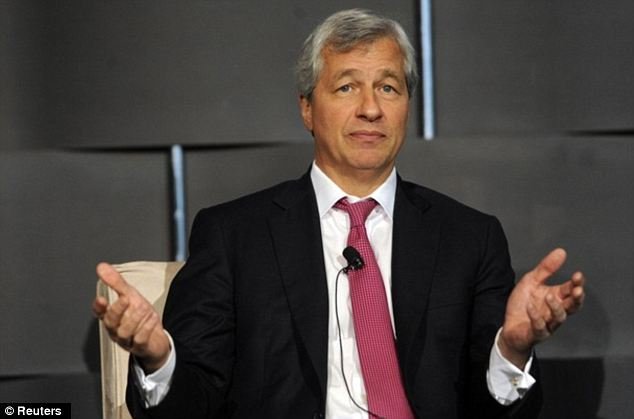
Paltry estimates: CEO Jamie Dimon initially thought that the bank would lose $2billion from the bad trade but that has ballooned into $5.8billion according to a statement Friday

Retired early: Ina Drew had been at the bank for over 20 years and retired amid the scandal and quickly offered to give back the $31.5million she earned in the last two years
The bank said that it was reducing its net income for the first quarter by $459million because it had discovered information that 'raises questions about the integrity' of values placed on certain trades.
Adding to the perception problems facing JP Morgan, the bank said it earned $5billion, or $1.21 per share, for the second quarter, which covers April through June and includes the bank's disclosure of the trading loss on May 10.
This marks an unexpected profit, as analysts surveyed by FactSet, a provider of financial data, had expected JPMorgan to earn 76 cents per share.
JPMorgan's stock climbed $1, or 3 per cent, to $35.05 after Dimon seemed to indicate that the losses from the trade were contained. Dimon said that the trade might not lose any more money.
Investors were also cheered to hear that the bank might resume its plan to buy back its own stock.
Dimon said the bank was in discussions with the Federal Reserve and would submit a plan in hopes of buying back stock starting late this year. The company suspended an earlier plan to buy back $15billion of its stock after reporting the trading loss.
Just three months ago, JPMorgan was viewed as the top American bank, guided by Dimon's steady hand.
Since the disclosure of the trading loss, however, that reputation has been eroded.
President Obama didn't seem too perturbed by Dimon's andling of the situation, and stuck by his friend when asked about the financial sector during an appearance on The View.
Mr Obama said Dimon 'is one of the smartest bankers we got, and they still lost $2billion and counting.'
Dimon, who originally dismissed concerns about the bank's trading as a 'tempest in a teapot,' appeared before Congress twice to apologize and explain himself, and several government agencies have launched investigations.
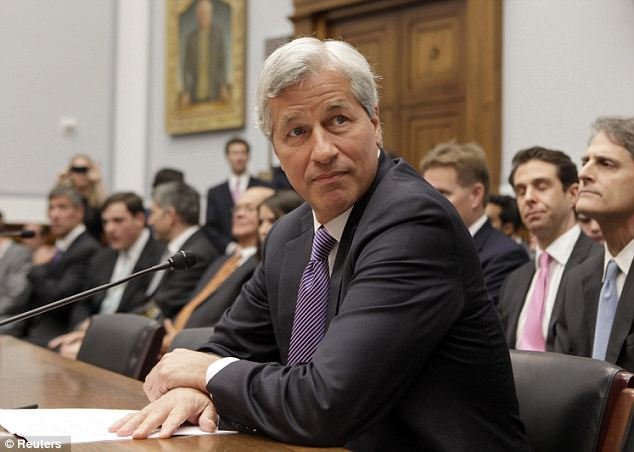
Explanation: Dimon appeared twice in front of the House Financial Services committee to apologize and explain the loss and many described his attitude as cavalier
The Securities and Exchange Commission and Justice Department did not immediately respond to requests for comment.
JPMorgan has lost about 15 per cent of its market value since the loss came to light.
Dimon said Friday that Ina Drew, the bank's former chief investment officer, who left after the trading loss came to light, had volunteered to give back the maximum possible amount of pay.
The maximum appeared to be two years' worth of pay. Drew made $15million in 2011.
Mike Cavanaugh, who is leading a team of JPMorgan executives overseeing the trading loss, said the bank would also seek to revoke two years' worth of pay from other top managers tied to the trade.
That procedure is known as a 'clawback.' It would be the first time JPMorgan exercised such a procedure.
The Wall Street Journal reported Friday that three other employees of the bank tied to the trade, including one who was known as the 'London whale,' had left the bank.
Under close questioning from lawmakers in June about his own role in setting up the investment division responsible for the mess, Dimon declared: 'We made a mistake. I'm absolutely responsible. The buck stops with me.'
The trading loss has raised concerns that the biggest banks still pose risks to the U.S. financial system, less than four years after the financial crisis erupted in the fall of 2008.
Warning! This user is on my black list, likely as a known plagiarist, spammer or ID thief. Please be cautious with this post!
To get off this list, please chat with us in the #steemitabuse-appeals channel in steemit.chat.